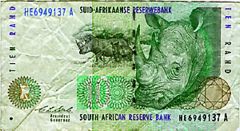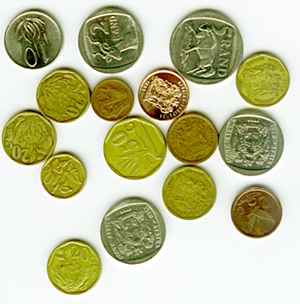![]()
|
|
|||||
|
The images flow in rapid succession, each testifying to the agony and promise of a nation in the throes of transformation. Scene 1: A rich cotton and sweet potato farm 44 miles north of the capital, Pretoria, where tears well in the eyes of an Afrikaner housewife as she recalls the recent telephone death threat issued to her husband by a black man demanding jobs and higher pay for region's impoverished black farm workers. "We have always been so good to these people," the white woman says bitterly. "Why now do they want to kill?" Scene 2: A downtown street corner here in Johannesburg, where three young black university students declare to a visitor that it's high time for the ruling African National Congress to go in the coming June vote, for as one puts it, "The people are hungry, the criminals are loose, and the ANC has helped no one but themselves." And scene 3: A muggy, ground-floor ward at Chris Hani Baragwanath Hospital in the teeming township of Soweto -- the world's largest public health facility -- where more than a score of pregnant women infected with the HIV virus listen to a 26 year-old counselor named Florence Ngobeni tell them heartbreaking news: There isn't nearly enough AZT medicine to go around for all who need it to protect their babies. "The only thing we can do is demand more help from government, to fight, to make our voices heard," says Ngobeni, who herself is HIV positive and lost her husband and only baby to AIDS three years ago. "No AZT, no vote!" It's late March and we are nearing the end of a 12-day reporting trip to South Africa -- eight graduate students from UC Berkeley School of Journalism, Newsweek's Jeff Bartholet, and I -- and for all of us the experience has been breathtaking. An international reporting course that began in January in Berkeley as an exciting, but academic, study of South African society and issues related to the coming elections has become, three months later, a priceless and incomparable exercise in on-the-ground journalistic training. Second-year student Vicki McClure's story about water shortages here has taken her to distant farms in the northern countryside, where wealthy white farmers and their families complain about population pressures and growing security concerns. First-year Erica Terry's project on women and HIV, which is aimed for publication in Newsweek International, has seen her explore the Soweto prenatal clinic on the front lines in South Africa's war on AIDS. There, agonized health workers daily must wrangle over moral issues connected with deciding who is to receive precious supplies of AZT and who is not from among hundreds of pregnant women infected with the disease. And first-year student Chris Jenkins has been working almost nonstop from the moment we arrived in Africa last Saturday, seeking out and interviewing township gang members and riding along with Johannesburg cops late into the night as part of a remarkable story for the Christian Science Monitor about American Hip Hop culture and its influence among South African youths. A running backdrop to this work is the elections, of course, a critical crossroads in South Africa's fledgling democracy. The feisty newspapers and vibrant electronic media are filled each day with stories about political maneuverings among the dozen or so parties contesting the vote. And even as I write this, Nelson Mandela, the beloved, 81-year-old president, is receiving adoring accolades and well wishes from politicians of all stripes in his last appearance before the South African parliament before he departs South African politics, barely more than two months from now, a deeply moving event being broadcast across the nation. But it is the larger story behind these elections, the one simmering in the difficult social and economic problems facing South African society, that the students are exploring this week, and at nearly every turn they are finding journalistic gold: Sherri Day among the poor in Alexandra, where more than 750,000 people struggle to survive in a one-square-mile patch of squalor; Suzanne Pardington in a township hospital emergency room, where she is spending an entire night to assess the tragic results of gun violence; Jessie Deeter in city gay bars and regional prisons; Lynn Burke with the victims of carjackings, racial violence and other forms of trauma; And Nandi Pointer with the growing legions of child prostitutes on Johannesburg's desperate streets. These are raw, intensely enlightening experiences for the students, whose emotional reaction to their work has ranged from tears of sorrow to elation over South Africa's political potential and cultural riches. As the instructors of this course, Jeff, a teaching fellow at the Journalism School this year on leave from Newsweek, and I, enjoy arguably the finest vantage of all in this adventure. Each day we get to accompany the students as they make their rounds. Thus, we are able to witness not only the light of their discoveries with them but also the full flowering of the reporting and interviewing skills they acquired in their boot-camp-like first course at the school, J200. At the same time, Jeff and I are enjoying enough room to pursue our own journalistic projects, Jeff's a magazine piece about South African cuisine in which he is going around town sampling everything from fried caterpillars to barbecued crocodile ribs. My project is a little easier on the stomach. I'm gathering string for a personal essay joining two topics: The challenges of journalism education in a rare context like this, and the mix of emotions I am feeling this week about my first return to Africa since 1992, when I left the continent after serving three years as the Washington Post's Africa bureau chief based in Kenya. Those years were not promising ones for a free press in Africa, where numerous authoritarian rulers and single party states tolerated -- then and now -- little political dissent or freedom of expression. But in at least one respect South Africa has been an outright inspiration, offering us a veritable bounty of daily newspapers, magazines, and independent radio and television news sources catering to every taste. Perhaps nowhere is this festival of free expression better exemplified than by the South African Broadcasting Corporation. In the 1980s and before the SABC stood as the despised voice of apartheid to millions of oppressed people, trafficking in propaganda and lies aimed largely at protecting the racist state. Today, enjoying far greater independence and press freedoms guaranteed by South Africa's extraordinary new constitution, the SABC's lively, multi-lingual television and radio news programs stand as continental models of balance, fairness, and credibility. Yesterday, I was pleased to spend an entire work shift at SABC with the talented and racially-diverse crew of reporters, editors, and producers responsible for a nationally-broadcast news and current affairs radio program called "A.m. Live." It's truly a terrific show that stands as this country's proud answer to NPR's "All Things Considered." Our
time in South Africa may be dwindling, but our discoveries continue
apace. We travel next to Cape Town for two days before winging our
way back to the States. Throughout April, as the students aim to
publish their work in local and national publications, be sure to
watch this space. Meantime, cheers and best wishes from the other
side of the world.
-- Neil Henry
|
|
||||
| |
|||||


